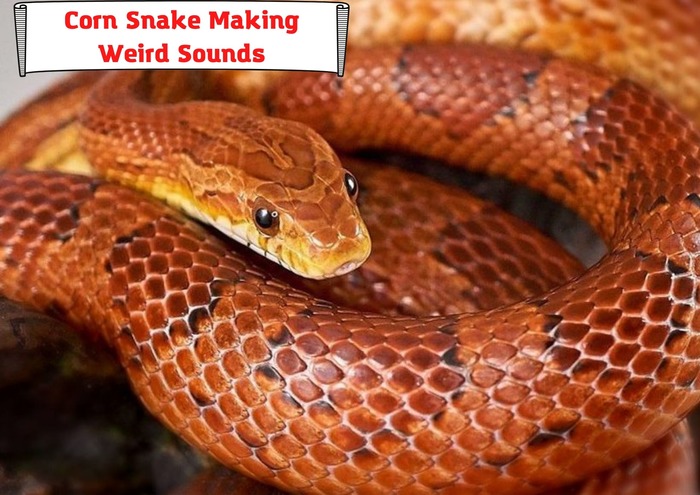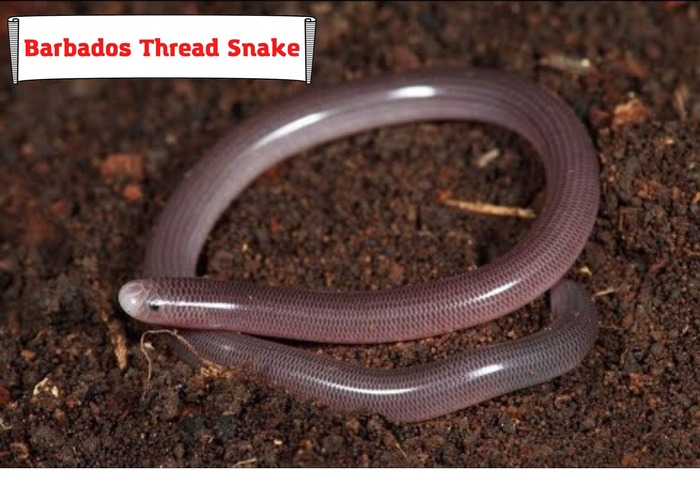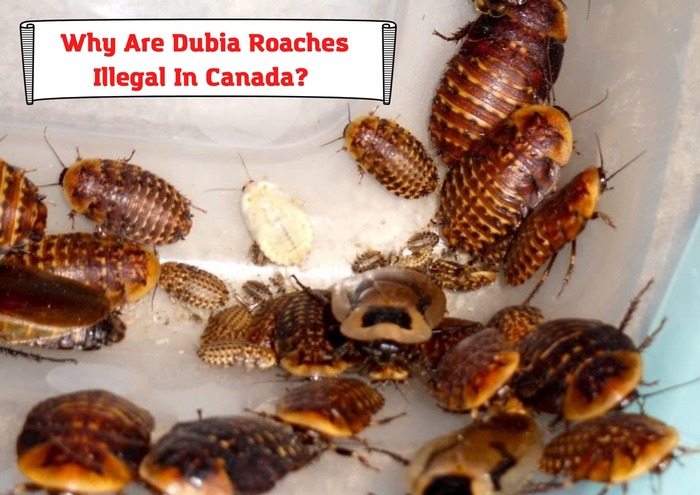
Dubia roaches roam the wild in some countries but are considered invasive in others. One of those countries is Canada.
This article will answer why Dubia roaches aren’t legal in Canada by discussing the following:
- Dubia roaches in Canada
- The rationale for the restriction
- What to do
- Problems you may get if caught
So read on!
About Dubia Roach
Many people know them as Argentinian wood roach, Orange-spotted roach and even Guyana spotted roach. But the Dubia roach is properly identified with its scientific name Blaptica dubia.
They come from Central and Southern America. They come from as far as Brazil and other tropical places around there. They can’t grow too massive to handle. Dubia roaches grow between 40-45 millimeters. This means the biggest size you can get would be around four and a half centimeters.
Although the male Dubia roaches have full wings that cover the length of their bodies, the wings are useless for flight. The best the wings can do is to direct it and help it land safely if it drops from anywhere. The female Dubia roaches only have tiny stubby wings. They do not cover the length of their bodies. They are called Tegmina. They do not have the body mass to use the wings.
Dubia roaches are viviparous. This means that they “give birth” rather than lay eggs. The females get pregnant, but she develops the nymphs in their ootheca. The ootheca is a long multi-celled egg sack. Birth occurs when the female Dubia roach expels her ootheca. This means they hatch inside the female and come out of her as live-bearing babies. The nymphs start to appear from their oothecae shortly after she has discharged it. They are usually white and very small when they hatch but will start to turn gray shortly after. The change in color is because their exoskeletons gradually harden as they become exposed to the air.
The greatest killer of Dubia roaches is dehydration. Dubia roaches can die of dehydration faster than they would from a disease or any other problem. Dehydration will negatively impact the rate of reproduction. Your Dubia roaches won’t be focused on giving birth if the colony is dehydrated. They will naturally focus their body resources on survival.
Dehydration could also spike the death rate in the colony. It would be best if you constantly made sure that there was moisture in the air to avoid losing a huge portion of your colony.
A single female Dubia roach can give birth to anywhere from 15 to 40 nymphs! Since they can give birth up to 9 times, a female Dubia roach can give birth to as many as 135 to 360 babies during her lifespan! This explains their ban in some places and why they have a massive infestation in others.
Dubia Roaches in Canada
Many sites argue that Dubia roaches are outright illegal in Canada. This has been reposted time and again without a thorough explanation. The truth is that Dubia roaches are not wholly illegal in Canada, but their acquisition is extremely restricted and controlled.
This means that while they are not totally prohibited, they may be acquired, but the acquisition is subject to some conditions. These conditions relate to the purpose of the acquisition and the need to get a permit from the authorities first before importing or acquiring Dubia roaches in Canada.
The appropriate authority for the regulation is the Canadian Food Inspection Agency for this case. The agency lists Dubia roaches by the Scientific name Blaptica Dubia as being restricted for importation. Dubia roaches may be imported into the state only for exhibition purposes upon the acquisition of a requisite permit for the importation purpose.
What this means is that only a zoo, an insectarium, or similar outfits may possess Dubia roaches for display purposes. But they must have acquired a permit for the purpose.
Other purposes for possession, such as breeding or sale, are strictly prohibited. There are penalties to enforce these regulations as directed by the Canadian Food Inspection Agency. These penalties essentially are fines. The range depends on the severity of the breach of the regulation. In other instances, the penalties may include holding the violator responsible for the costs of seizing and disposing of the specimens.
Hence, alien roaches may be possessed in Canada only for research or display purposes in educational institutions and facilities. Importation for breeding or commercial purposes is prohibited.
The Rationale For The Restriction
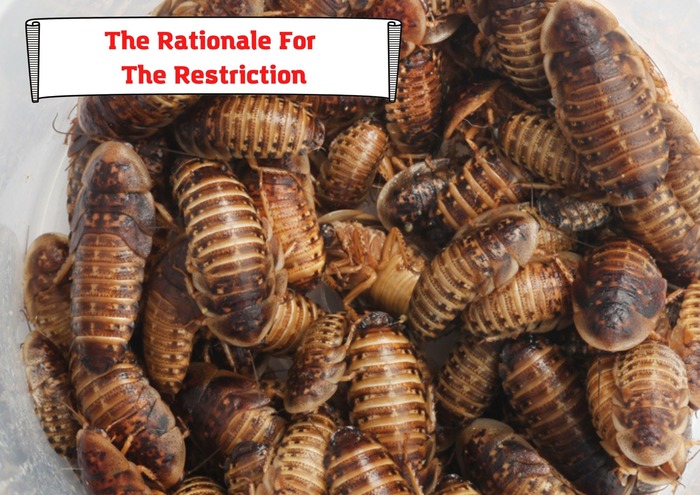
The prohibition in Canada is more a matter of import restriction first before other reasons. Dubia roaches are often viewed as invasive species in many places where their possession is restricted or prohibited outright. For instance, there is an outright ban on Dubia roaches in Florida. This is to prevent the invasive roach species from causing damage to the environment. Florida has a perfect condition for breeding Dubia roaches. A few loose species in the open is a potential disaster for the state and pest controllers. They could multiply in an inestimable number in a matter of months, costing the state a lot of money in controlling their spread.
The weather conditions and other factors make it difficult for roaches to multiply in other states. Places like Iowa have conditions that are unfavorable for breeding Dubia roaches. This means that if they got loose, they would eventually die off.
What To Do
Alien insect species can have a negative impact on the environment if they are let loose. Their release, whether deliberate or accidental, can be illegal if they constitute a threat to the native species of the state. Dubia roaches are illegal in many states with tropical climates because the environmental conditions allow them to thrive and multiply in number. If you have Dubia roaches in a place where it is prohibited, it would be best to avoid the wrath of the law. Disposing of them properly would be a way to obey the law. This is important for two reasons:
- It protects the privilege of keeping pets as responsible pet keepers.
- It is a way to assist the law in protecting the environment.
What Could Happen If You Violate The Regulation?
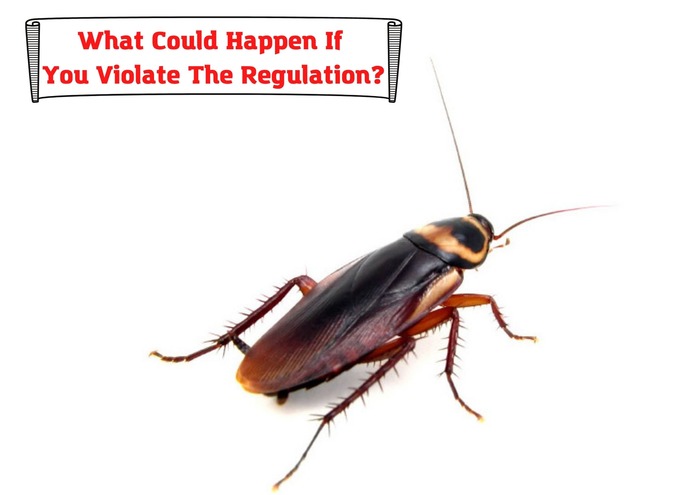
Here are a few things that could happen if you violate the restrictive regulations on the purpose of importing Dubia roaches.
- You could be found guilty for the general offense of contravening the regulation. You could be fined a sum of up to $50,000 or put in prison for up to six months. In special instances, the Judge could sentence you to both!
- You could also be found guilty of an indictable offense and sentenced to prison for up to two years. Alternatively, you could be fined up to $250,000 or even serve both punishments.
- You could also be liable for other fines where you commit a specific offense. For instance, If you import Dubia roaches without the requisite permit, you could be fined a sum of up to $50,000.
- Even if you are not the person who imports it, if you are found to have aided the violation of the regulation, you could also be convicted.
The police or any other relevant agency could get a court warrant to search your premises if they have reason to believe that you are breeding Dubia roaches. Also, you could be made to bear the cost of the destruction and other necessary expenses the government agency incurs to remove and dispose of the roaches. This is apart from the costs of the fines and prison time you are likely to do.
Bottom Line
It is possible to acquire Dubia roaches in Canada. That acquiring them is subject to two conditions:
- obtaining the necessary permit for the acquisition;
- acquiring them for display and research purposes only.
That means that while acquisition is not illegal, possessing Dubia roaches for breeding purposes would be going against the legally permitted reasons for possessing them. It would be best to seek other alternatives to feed your critters rather than offend the law and misuse the privilege of owning pets.
- Dubia Roach Egg Sack: How To Understand if It’s Healthy? - January 2, 2023
- How To Feed African Dwarf Frog While on Vacation? - December 26, 2022
- Baytril for Bearded Dragon: Here’s What You Should Know - December 19, 2022
